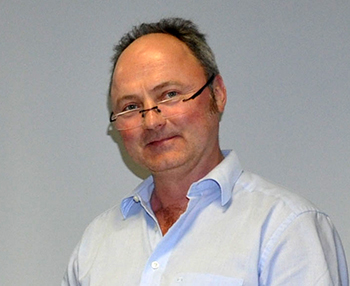
Dr Joerg Szarzynski, head of the EduSphere section
and Education Programme Director at the
United Nations University, Institute for Environment
and Human Security.
Photo: Supplied
“This new development will strengthen the long-lasting collaboration between DiMTEC and the United Nations University, Institute for Environment and Human Security (UNU-EHS) in Bonn in Germany. This [collaboration] goes back for almost a decade of joint training courses and increasingly also includes collaboration in the frame of scientific projects, especially in Africa.”
These were the words of Dr Joerg Szarzynski after his appointment as Affiliated Associate Professor to the Disaster Management Training and Education Centre for Africa (DiMTEC) at the University of the Free State (UFS). Dr Szarzynski will assume his new position with immediate effect.
The United Nations University (UNU) is a global thinktank and postgraduate teaching organisation headquartered in Japan.
Dr Szarzynski, head of the EduSphere section and Education Programme Director at UNU-EHS, brings with him a wealth of experience, including serving as senior expert to the United Nations Platform for Space-based Information for Disaster Management and Emergency Response (UN-SPIDER). Within the team, he was principal desk officer for Africa responsible for relief activities after natural disasters, technical consultation, information management, collaborative network development and the cluster on health and climate change adaptation. He also has broad expertise in climatology and remote sensing, global environmental change research, capacity-building and web-based data and information management.
“Dr Szarzynski’s appointment brings
new research opportunities.”
Lecture focus on vulnerability and disaster risk reduction
As part of his new academic responsibilities, Dr Szarzynski will conduct face-to-face lectures during a course on vulnerability and disaster risk-reduction. With this course the centre aims to increase awareness of the complexity and importance of vulnerability and resilience in the field of disaster risk management. Dr Szarzynski’s teachings will focus on Early Warning Systems and Geospatial Technologies in Support of Disaster Risk Reduction (DRR) and Emergency Response Preparedness. He will also lead courses on Assessment and Coordination in International Disaster Management and Humanitarian Response and Information Technology in Disaster Risk Reduction and Disaster Management.
Furthermore he will give lectures via distance learning for the wider curriculum at DiMTEC.
Collaboration between DiMTEC and UNU
Dr Andries Jordaan, Director of DiMTEC at the UFS said: “His appointment opens new networks within the United Nations system, which brings new research opportunities. Furthermore, his expertise is important to us. He has already provided input and delivered lectures through Skype in the course of Information Technology and Communication.”
Dr Szarzynski has been lecturing for the past 10 years in the UFS’ international PhD curriculum.